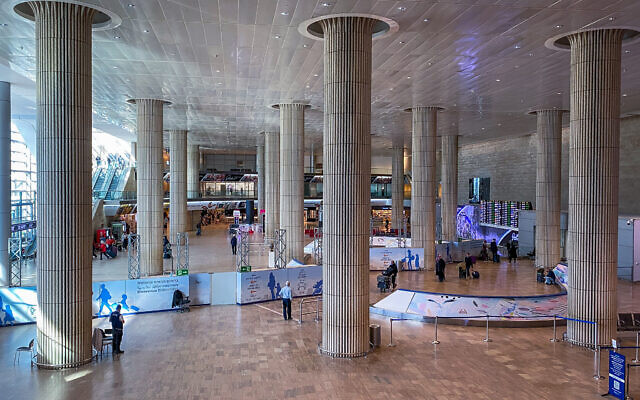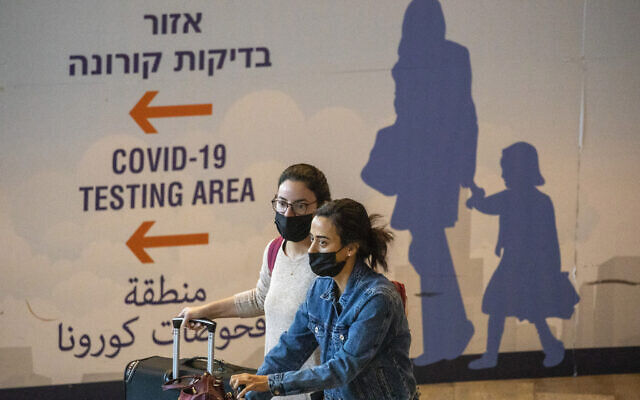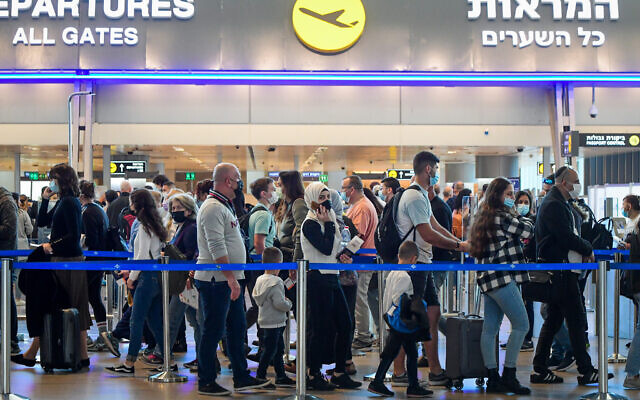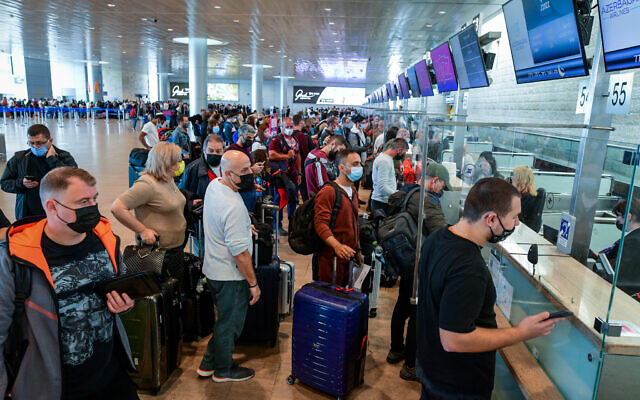As new restrictions take effect, all Israelis returning to country are now required to immediately enter quarantine until confirmed virus-free by twin PCR tests

Israel closed its borders to non-citizens at midnight Sunday in an effort to block the Omicron coronavirus variant from spreading to the country, as new entry rules entered effect.
Israelis returning home will now be placed under a tightened quarantine regime and can be subjected to controversial phone tracking by the Shin Bet security service if confirmed to have the new strain.
The measures, valid for two weeks, were approved on Sunday by the cabinet. Two people in Israel have been diagnosed with the Omicron variant, a highly mutated and infectious COVID-19 virus first detected in South Africa. Several others are suspected of having the virus.
Under the new rules, all Israel entering the country, including those who are vaccinated against COVID-19, must take a PCR test at Ben Gurion Airport when they arrive and then immediately go into home quarantine.
Vaccinated arrivals must spend at least three days in quarantine and then take another PCR test. A negative result grants exit from quarantine. Those who don’t take the second test must stay in quarantine for a total of 14 days.
Unvaccinated Israelis who have not recovered from the disease must spend at least seven days in quarantine and then take a PCR test, with a negative result enabling them to end isolation. Those who don’t take the second test must stay in quarantine for a total of 14 days. Failure to take another PCR test at the end of the 14 days will result in a fine, the Ynet website reported.
Under the new rules, all arrivals are barred from using public transportation to leave the airport. Exiting the airport is possible by a private vehicle, by being collected by relatives, or by a taxi, in accordance with rules published Sunday by the Transportation Ministry.

However, Israelis arriving from countries on the government’s “red” list — meaning countries with high COVID-19 infection rates or with Omicron cases — must take a PCR test at the airport and then immediately enter one of the country’s two state-run quarantine hotels, located in Jerusalem and Tel Aviv. If the PCR test taken at the airport is negative, returnees can continue their quarantine at home, staying isolated for seven days and then taking a second PCR test.
The hotel quarantine rules for arrival from red countries came into effect already at 6 p.m. on Sunday.
The new rules, banning entry for non-nationals and stricter quarantine for Israelis, will remain in place for two weeks until December 7.
Last Friday, the government banned Israelis from traveling to 50 countries in Africa, designating them “red.” Traveling to any of those countries without first getting special permission from a state exemptions panel carries a fine of NIS 5,000 ($1,570).
Inside Israel, rules for the Green Pass system governing mass-attended events were changed, requiring the system be applied to indoor events of just 50 attendees instead of the previous 100.
Also, anyone exposed to a confirmed Omircon patient must go into quarantine for a week, including those who are vaccinated.

The Shin Bet tracking, which will only be used to trace contacts with those confirmed as having the Omicron variant, has been criticized by rights groups. Though approved by the cabinet, four ministers opposed using the measure.
Tour and air travel companies said there was a wave of cancelations in the wake of the orders, in particular from tourists who canceled their visits to Israel, Channel 13 news reported.
“It is a copy-paste of March 2020,” tour guide and organizer Yonatan Weiss told Channel 13, referring to the first blow the coronavirus dealt to the travel industry last year at the start of the pandemic. “Like a house of cards, everything that was booked, and there were a lot of bookings, was canceled in one fell swoop.”
Weiss said those in the tourism industry are demanding that the government offer them compensation for their losses during the pandemic.
Rony Timsit, manager of the Inbal Hotel in Jerusalem, said there were over 100 tourists who had been scheduled to arrive on Monday.
“These people can’t get into the country,” he said. “In practice, everything has changed.”

While he acknowledged the new rules were severely impacting the industry, Tourism Minister Yoel Razvozov said the government preferred to err on the side of caution over risking another outbreak in the country.
“Since we don’t know the influence of the variant, we prefer to make a mistake and to have the tourism industry, which is the prime victim, get compensation later, rather than that having the whole economy and our children suffer, having the economy collapse,” Razvozov told Channel 13.
“We will know how to compensate the tourism industry,” he said, without elaborating.
Yet despite the new travel rules, which were only formulated on Saturday night, some 23,000 Israelis continued with their travel plans and flew out of the country on Sunday, Channel 13 reported.
“We need to learn to live with it,” a flyer, identified only as Nicole, told the network. “The coronavirus is not going to simply disappear.”
As reported by The Times of Israel
